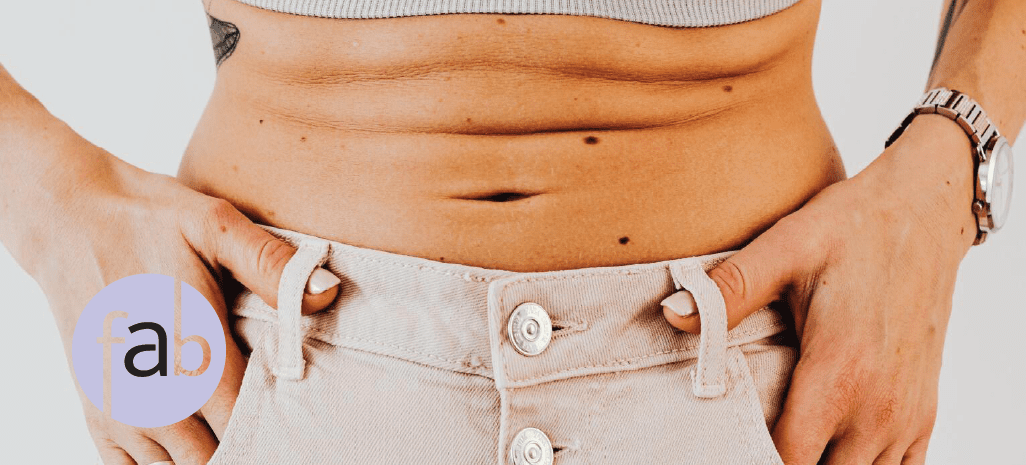Imagine standing in front of the mirror and seeing your stomach skin not quite hugging your body the way it used to. This change, often unwelcome, can spring from weight loss triumphs, the aftermath of pregnancy, or simply the passage of years.
It’s a story of skin losing its snap-back, a tale as old as time but not without solutions. In this sea of change, there are lifeboats-natural methods, medical treatments, and ways to fire up your collagen production.
Consider this an invitation to dive into a world of possibilities where the dream to tighten stomach skin is an achievable reality. Stick with us, and let’s explore how to turn the tide in your favor.
Understanding Skin Elasticity and Causes of Loose Skin
Our skin’s journey through time and circumstance can leave its mark, especially around the stomach. This change in skin texture and firmness isn’t random; it’s deeply rooted in various factors that play a significant role in our skin’s health and appearance.
Aging and Collagen Production
As time marches on, our skin often bears the brunt of the aging process. This is largely due to a decrease in collagen production, the protein that acts as the skin’s support structure.
In our youth, collagen is abundant, giving our skin its plump, firm appearance. However, as we age, collagen production dwindles, leading to a loss of skin elasticity.
This natural aging process can result in the skin around the stomach becoming looser and less firm, a common concern for many.
Weight Loss and Pregnancy Effects
Significant weight loss and pregnancy are also major contributors to changes in skin elasticity. After weight loss, especially if it’s rapid or substantial, the skin may not shrink back to fit the body’s new shape, leading to loose skin.
Similarly, during pregnancy, the skin stretches to accommodate the growing baby. Post-pregnancy, this stretched skin may struggle to return to its pre-baby firmness.
Both scenarios challenge the skin’s elasticity, often leaving the stomach area with excess skin.
Lifestyle Factors
Lifestyle choices can significantly impact skin health and elasticity. Factors like sun exposure, smoking, and poor nutrition can accelerate skin aging and impair its ability to bounce back.
Sun damage, for instance, can break down collagen and elastin, the fibers responsible for skin’s firmness and elasticity. Smoking reduces blood flow to the skin, hindering the skin’s ability to repair and maintain itself. A diet lacking in essential nutrients can also deprive the skin of the building blocks it needs for resilience and firmness.
By understanding these lifestyle impacts, one can take proactive steps to preserve skin elasticity, especially around the stomach.
Natural Methods to Tighten Stomach Skin
Turning to nature’s toolbox, there are several ways to help tighten stomach skin without stepping into a clinic. These methods, rooted in everyday habits and simple changes, can make a significant difference over time.
Hydration and Diet
The journey to tighter stomach skin can start with what you put on your plate and in your glass. Hydration plays a crucial role in maintaining skin elasticity. Drinking plenty of water ensures the skin remains hydrated, which can improve its overall texture and tightness.
Incorporating foods rich in vitamins C and E, omega-3 fatty acids, and antioxidants can boost skin health. Think colorful fruits, leafy greens, nuts, and fatty fish.
These nutrients support collagen production and help maintain the skin’s elasticity, potentially reducing sagging.
Exercise Routines
Exercise isn’t just for building muscles or losing weight; it’s also vital for skin health. Engaging in regular physical activity, especially exercises that target the abdominal area, can help tone the muscles beneath the skin, making the skin appear firmer.
Strength training, yoga, and Pilates are excellent for building core strength. Consistency in these exercises can lead to improved skin tightness in the stomach area, complementing your dietary efforts.
Natural Skin Tightening Remedies
Nature’s cabinet offers several remedies that can aid in tightening stomach skin. Topical applications like aloe vera, which contains malic acid, can improve skin elasticity.
Similarly, using products with hyaluronic acid can hydrate and plump the skin. Massaging the stomach area with oils rich in vitamin E and antioxidants, such as almond or coconut oil, can also stimulate blood circulation and skin tightening.
While these remedies may offer gradual results, their regular use in conjunction with diet and exercise can contribute significantly to your goal of firmer stomach skin.
Medical Treatments for Saggy Skin
When natural methods fall short in tightening stomach skin, medical treatments offer a helping hand. These options, particularly non-invasive and minimally invasive procedures, provide effective solutions with less hassle than traditional surgeries.
Non-Invasive Procedures
Non-invasive treatments are a go-to for many, thanks to their simplicity and quick recovery. Treatments like SculpSure and VANQUISH ME™ are standout choices in this category.
SculpSure uses light-based technology to target fat cells, indirectly aiding in skin tightening. VANQUISH ME™ employs radiofrequency to eliminate fat cells, which can lead to firmer skin.
These procedures are favored for their effectiveness and minimal downtime, making them popular choices for those looking to improve the tightness of their stomach skin.
Minimally Invasive Techniques
Minimally invasive techniques offer a more intensive approach than non-invasive methods, without the full commitment of surgery. These include procedures like laser therapy, which stimulate collagen production to improve skin firmness and elasticity.
They provide a balance between achieving noticeable results and having a manageable recovery period, appealing to those seeking a middle ground between natural methods and surgery.
Surgical Options
While surgical options like liposuction and tummy tucks have been traditional methods for addressing excess stomach skin and fat, our focus is on non-surgical alternatives.
Advances in technology have made treatments like SculpSure and VANQUISH ME™ increasingly popular. These methods offer effective results with fewer risks and a shorter recovery period, aligning with the trend towards less invasive cosmetic procedures.
Boosting Collagen Production Naturally
Boosting collagen is key for firmer stomach skin. Collagen, a protein that keeps our skin tight, can be increased with the right food, skincare, and lifestyle habits.
Diet and Supplements
Your diet plays a big role in collagen production. Foods rich in Vitamin C like oranges and strawberries help make collagen. Protein from chicken, fish, and beans also builds collagen.
Antioxidants protect your skin, so eat plenty of those too. Supplements like collagen peptides and hyaluronic acid can give an extra boost, helping your skin stay firm.
Skincare Products
Certain skincare products can increase collagen in the skin. Look for products with retinol or peptides; they encourage your skin to make more collagen.
Hyaluronic acid, often in moisturizers, helps plump up the skin. Using these regularly can improve your skin’s firmness.
Lifestyle Changes
Lifestyle has a big impact on skin health. Protect your skin from the sun, as UV rays can break down collagen. If you smoke, quitting can help protect your collagen.
Exercise is great too; it boosts blood flow, feeding your skin and aiding collagen production. These changes are not just good for your skin but for your overall health too.
Preventive Measures and Long-term Care
For lasting firmness in the stomach skin, a combination of preventive steps and ongoing care is essential. Starting with daily skincare routines can set a strong foundation for maintaining skin health and elasticity.
Daily Skincare Routines
Committing to a daily skincare routine is fundamental for preserving the health and elasticity of your stomach skin. Here’s a breakdown of an effective routine:
Cleansing
Start with a gentle cleanse. This step is crucial for removing impurities and preparing the skin for further treatment. Opt for a cleanser that suits your skin type, avoiding anything overly harsh which can strip the skin of its natural oils.
Exfoliation
Regular exfoliation, ideally a few times a week, helps eliminate dead skin cells that can make your skin appear dull and impede the absorption of other skincare products. Choose a gentle exfoliant to avoid skin irritation and maintain skin health.
Moisturizing
Hydration is key for maintaining skin elasticity. Daily moisturizing keeps the skin supple. Ingredients like hyaluronic acid or natural oils such as jojoba or almond oil are excellent for retaining moisture in the skin.
Sun Protection
Protecting your skin from UV rays is crucial, even if your stomach isn’t directly exposed to sunlight. UV damage can degrade skin elasticity over time, so incorporating sunscreen into your routine is a wise preventative measure.
Targeted Treatments
If you’re dealing with specific issues like stretch marks or loose skin, incorporate products that target these concerns. Ingredients like retinol, vitamin C, and peptides can be particularly effective in addressing these skin issues.
Consistency
The effectiveness of any skincare routine hinges on consistency. Regular application and adherence to your skincare routine will yield more substantial and lasting results than sporadic efforts.
Gentle Massage
When applying skincare products, a gentle massage in circular motions can be beneficial. This practice not only aids in product absorption but also improves blood circulation, which can contribute to skin firmness.
Stay Hydrated
While external hydration is important, internal hydration plays a crucial role as well. Drinking enough water throughout the day supports overall skin health and can enhance the effectiveness of your topical skincare routine.
Regular Exercise and Healthy Diet
Keeping your stomach skin tight and healthy isn’t just about what you put on it. It’s also about what you put in your body and how you move it. Here’s the deal with regular exercise and a good diet:
Regular Exercise
Working out does wonders for your skin. It boosts blood flow, bringing more nutrients and oxygen to your skin cells. This helps keep your skin healthy and elastic.
Exercises that focus on your belly, like planks or yoga, can really help tone the muscles underneath, making your skin look tighter. The key is to stick with it – regular exercise is the best way to see results.
Healthy Diet
Your skin loves it when you eat right. Foods packed with antioxidants, like fruits and veggies, fight off damage to your skin. Omega-3 fatty acids, found in fish and nuts, are great for keeping your skin in top shape.
And don’t forget about vitamins C and E; they’re crucial for making collagen, which keeps your skin firm. Plus, staying hydrated by drinking plenty of water helps keep your skin plump and smooth.
So, a balanced diet does more than just keep you fit-it’s a big part of keeping your skin firm.
Regular Medical Check-ups and Consultations
Staying on top of your skin’s health involves more than just home care; it also includes regular check-ups and consultations with medical professionals. Here’s why they matter:
Importance of Regular Check-ups
Regular medical check-ups play a crucial role in maintaining skin health, especially for the stomach area. These check-ups can help identify any underlying health conditions that might affect your skin.
For instance, hormonal imbalances or nutritional deficiencies can have a significant impact on skin elasticity and overall health. Early detection of such issues allows for timely intervention and treatment.
Consultations for Tailored Advice
Consulting with dermatologists or skincare specialists is invaluable for getting personalized advice. These professionals can assess your specific skin type and conditions, offering tailored recommendations for skincare routines and treatments.
They can also provide guidance on effective methods for skin tightening and advice on preventing future skin issues.
Keeping Track of Skin Changes
As your body changes over time, so does your skin. Regular check-ups help monitor these changes, ensuring that your skincare routine and lifestyle habits are still effective.
Medical professionals can offer insights into adapting your skincare regimen as you age, helping to maintain firmness and health in your stomach skin.
By incorporating regular medical check-ups and consultations into your skincare routine, you ensure a comprehensive approach to maintaining firm, healthy stomach skin.
Achieving Your Ideal Stomach Skin
This guide has highlighted key strategies to tighten stomach skin, emphasizing the importance of a holistic approach. Remember, it’s about harmonizing natural routines with advanced medical treatments.
Atlanta Face and Body offers cutting-edge, non-invasive options like SculpSure and VANQUISH ME™, tailored to your unique skin needs. Ready to take the next step towards firmer, healthier skin?
Reach out to Atlanta Face and Body for personalized care that blends innovation with your individual goals.









